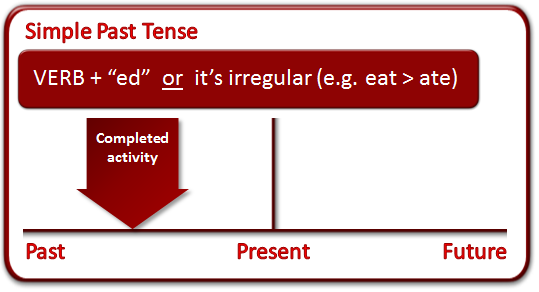Pelajari contoh berikut:
Wolfgang Amandeus Mozart was an Austrian musician and composer. He lived from 1756 to 1791. He started composing at the age of five and wrote more than 600 pieces of music. He was only 35 years old when he died.
Live/started/wrote/was/died adalah past simple. Past simple digunakan untuk menjelaskan sesuatu kegiatan di masa lalu dan telah berakhir.

Umumnya kata past simple berakhiran dengan “-ed” (regular verbs):
- I work in a travel agency now. Before that I worked in a shop.
- We invited them to our party but before they decided not to come.
- The police stopped me on my way home last night.
- She passed her examination because she studied very hard.
Banyak kata kerja merupakan irregular. Maka kata yang dipakai tidak menggunakan akhiran
-ed. Contoh:
Mozart wrote more that 600 pieces of music.
We saw Rose in town a few days ago.
I went to the cinema three times last week.
It was cold, so I shut the window.
Pada penggunaan kalimat tanya dan negatif kita menggunaan did/didn’t + infinitive (kata kerja pertama).
Kalimat positif:
I enjoyed the show.
She saw the beach.
They went somewhere.
Kalimat negatif:
I didn’t enjoy the show.
She didn’t see the beach.
They didn’t go somewhere.
Kalimant pertanyaan:
Did you enjoy the show.
Did she see the beach?
Did they go somewhere?
Hati-hati terhadap penggunaan “do” sebagai verb pada kalimat:
- What did you do at the weekend? (not ‘what did you do at the weekend’)
- I didn’t do anything. (not ‘what did you at the weekend’)
Kalimat past dari be (am/is/are) adalah was/were:
I/he/she/it + was/wasn’t || we + I/he/she/it?
we/you/they + were/weren’t || were + we/you/they?
Sebagai catatan kita tidak menggunakan did pada kalimat negatif dan pertanyaan dengan was/were:
- I was angry because they were late
- Was the weather good when you were on holiday?
- They weren’t able to come because they were so busy.
- Did you go out last night or were you too tired?
Sumber:
Murphy, Raymond. 1994. English Grammar In Use Second Edition. Press Syndicate: University Of Cambridge.